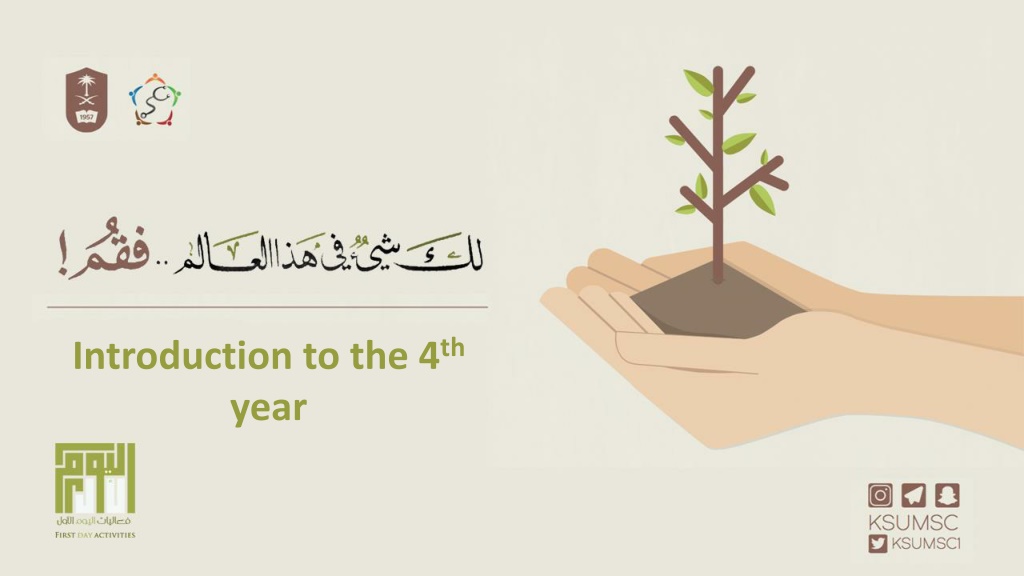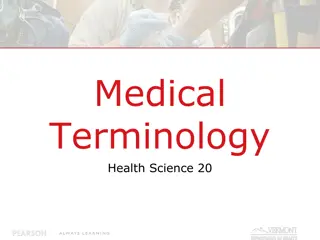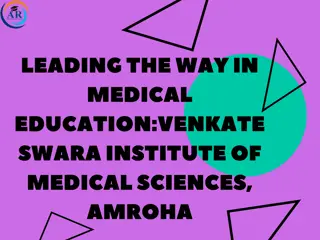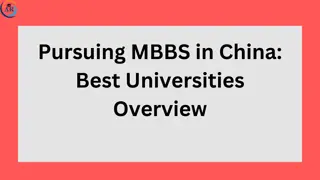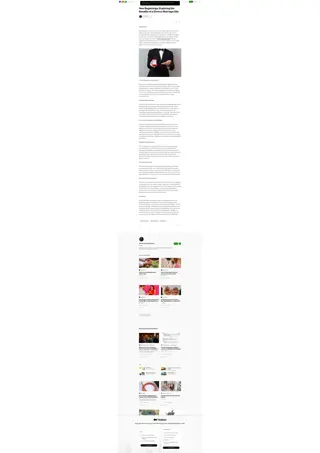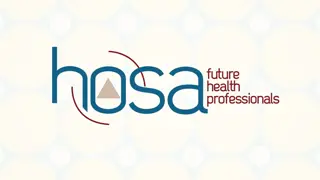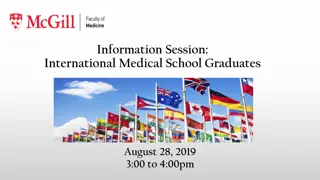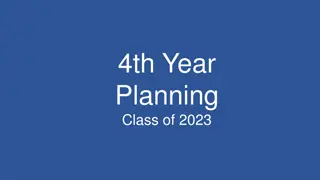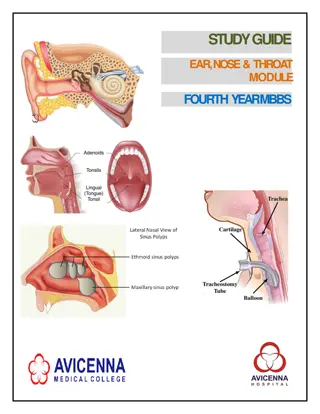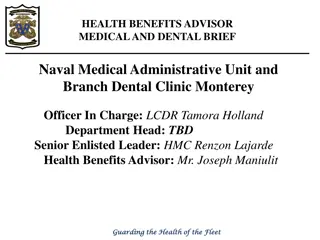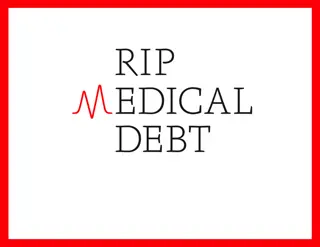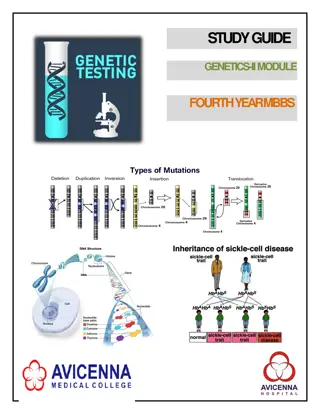Navigating the 4th Year of Medical School
Embrace the challenges and rewards of the 4th year in medical school, marked by cycles, clinics, and diverse subjects. Transition from lectures to hands-on experience with logbooks and exams while exploring various medical specialties. Stay adaptable and focused as you navigate the unique demands of each cycle and clinical setting.
Download Presentation

Please find below an Image/Link to download the presentation.
The content on the website is provided AS IS for your information and personal use only. It may not be sold, licensed, or shared on other websites without obtaining consent from the author. Download presentation by click this link. If you encounter any issues during the download, it is possible that the publisher has removed the file from their server.
E N D
Presentation Transcript
Brief talk This year has its ups and downs; enjoy the ups, stay strong during the downs. Form your own opinion regarding this year. It is one of the fastest years. The reference that we mention are just there to make things easier for you. You may explore other references and make sure you tell each other (and tell us, too) if you find new good references.
3rd Year vs. 4th Year Bye bye to subjects that stay with you all the year! Hello cycles! What does a cycle contain? - Lectures, sessions, exams, Logbooks... Additional things - Every cycle differs - Not all of them have midterms - Not all of them have the same requirements - At the end of the cycle all the groups (A, B, F) will have 2 weeks of exams, the finals will come for all the subjects one after another. Half of you will be free the other half will prepare for osce or midterm ! It is normal
4th Year Cycles 1st Term 2nd Term 1st Cycle 2nd Cycle 3rd Cycle Obstetrics and Gynecology (OBGYNE) Orthopedics Primary Care Anesthesia Ophthalmology Dermatology Ear Nose and Throat (ENT) Psychiatry
F1 F2 First cycle OB\GYNE Midterm OB\GYNE Anesthesia (2 weeks) Anesthesia (2 weeks) OB\GYNE Final OB\GYNE + Anesthesia Second cycle Ortho ENT + Ophtha Osce ortho Nothing ENT + Ophtha Ortho +Ortho osce Final ENT + optha + ortho Third cycle PHC Dermatology + psychiatry nothing Dermatology midterm \ psycatry video and case PHC Dermatology + psychiatry Dermatology midterm \ psychiatry video and case Nothing Final PHC + dermatology + psychiatry
Not all cycles in KKUH!!! OBGYN KKUH Cycle 1 Anesth KKUH Ortho KKUH Cycle 2 Optha KAUH ENT KAUH KKUH PHC PHC center of choice Cycle 3 Derm a Psych KKUH KKUH : psych lecture hall
Logbooks: Required by some cycles: Obgyne, Anesthesia, Primary Care) They re graded (usually) You fill in cases you have seen Different layout and requirements according to the department Keep it with you in all practical sessions (clinics, OR... Etc) so you can fill the cases. Or you can write them down on a paper and then copy them to the logbook Write them well because they read them !! Ask each department to set a date for submission.
Credit hours: 8 hours Marks distribution: Schedule of Assessment Tasks for Students during the Semester Assessment task (e.g. essay, test group project, examination, speech, oral presentation, etc) Week due Proportion of Total Assessment 1 2 Continuous Assessment : Case based discussion Continuous Assessment : Log Book Weekly 5% 5% Before the final exam Before the final exam Before the final exam ?Week-6 /Week-10 /Week-10 15% 3 Continuous Assessment : Mini-CEX (2 for each student) 5% 4 Continuous Assessment : DxR student assignments 5% 5 6 7 8 Mid Term MCQ assessment (50-60 MCQS) Final Examination : MCQ assessment (50-60 MCQS) Final Examination : OSCE (6-10 stations) Final Examination: Short Answer Questions relevant to clinical competencies using images and clinical scenarios (instruments identification, interpretation of investigations, clinical reasoning, management) (8-10 SAQS) /Week-10 TOTAL 20% 20% 25% 100%
CBD It is a group of vides around 30 video talk about different subjects in the OB\GYNE . They send it to you one day or one week before the session. With Questions you need to answer them. Prepare well for it because they will evaluate you without you knowing it IS YOU ! You will be divided to smaller groups. If you prepared well for it it will help you a lot in the exam.
Mini-CEX This time you will know that you will be evaluated. Your name will be set in the sechedule with a consultant. Read about the common things in the specialty of that consultant. Sometime you will be evaluated on history taking, labor room, clinics..etc If you will be evaluated in the history, take it one day before your evaluation. If you scored less than 4 sometime they will reevaluate you.
Skill lab: Each group goes more than once. It s in the medical education It s a simulated dummy that acts like it s giving birth. It actually screams and blink. Practice how to deliver the placenta, because this came as an OSCE station. Make sure to know the instrument and get the objectives of the skill lab from your doctor who gives the session
ER At the beginning of the shift, introduce yourself to the resident in charge, and tell them you ll be staying with them. They can be really helpful We were distributed to groups of 3-4 students, and had to attend the ER either the morning shift (8am 4 pm) or the evening shift (4 pm to 12 am). There might be emergency OR that you can attend Depends on your luck, no certain times for patients to come My experience, there wasn t any activities.
Labor and delivery: We were distributed to groups of 4-5 students, Attend full day of delivery. You must wear the clean green scrubs inside the L&D. You are required to write the cases you see in your logbooks(2 at least?) . You re required to attend a C-section. C-sections usually are held in the OR of the obgyne L&D ward, unless it s already occupied. Attend full day of C-secation. For those who could not attend, we ask the department to take on-calls.
Logbook Take it with you all the time either clinics, OR, delivery, ER. Any thing you see ask the consultant to sign for you. It is about the common things they do it in ob\gyne, like C-section, delivery, menopause, feeding, speculum..etc. You will submit 2 cases ( full history and examination) one OB and the other Gyne.
OSCE: Around 15 stations (10 stations on papers + 5 oral counseling station examples: OCP counseling Gestational HTN counseling Others 10 stations are just a picture on a table: Some pictures were about instruments, their use... Etc Some pictures were about obgyne diseases, and there were questions about them
References By the department : Essentials of Obstetrics and Gynecology by Hacker and Moore by the students: Kaplan videos (Dr. Sakala), and Kaplan Obgyne booklet
References In addition two the material of the lectures and videos we covered them in 433 team work . 428 obgyne booklet for revision In obgyne one source is not enough.
Anesthesia Credit hours: 4 hours. Marks disruption: a.Written (MCQ) Final: 40 b.OSCE exam: 50 c. Log book 10 References: Anesthesia booklet (from the department) , logebook, lectures.
What you will take? Lectures Practical sessions: Intubation, spinal and epidural anesthesia... Etc We had one session at the end that was a combination of all the previous sessions (like a revision) YOU MUST ATTEND CLINCAL SKILLIS SESSIONS, because all OSCE station are from these sessions. Attending the OR: Once we attended an operation Once we just went to the recovery room Case simulation: it was in the recovery room. A simulated dummy that we had to resuscitate as a team We were required to write the cases in the logbook Tip: Try to arrange students in each group to attend surgeries.
Anesthesia Logbook Preoperative visit Intraoperative Record Recovery room Postoperative or pain management Some information's were missing from the logbook to be filled, you have to add them manually . Don t copy form each others because 432 did it and the department noticed.
Orthopedics Credit hours: 6 hours. Marks disruption: a. Written (MCQ) exam: 40 b. OSCE: 40 c. CBL: 10 d. Continuous assessment: 10 You will take one lecture each day. Memorize them very well. References: Apley s System of Orthopaedics and Fractures. Doctors' Slides and notes from lectures + sessions
Lectures: important to attend (you will learn much from attending + the department is strict about it) Practical sessions: The studying source is the department s booklet (checklist from the department). Try to practice with your friends on the same day after the session Clinics: Try to be involved in the examination, or history taking Casting: You will have one session with the casting technician to teach you how to apply a cast. Other sessions will be for you to practice CBL (case based learning): different topics with different consultants will be divided to groups. There are an evaluation forms and objectives.
Ophthalmology Credit hours: 4 hours. Marks disruption: a. Written (MCQ) final exam: 30 b. SAQ (short answer questions) final: 40 c. OSCE: 20 d. Practical session attendance: 10 Final MCQ and SAQ were on the same day References: there are no objectives for this courses they say the lectures it self is the objectives but some doctors they don t give their presentations. Lectures , doctors notes. Recommended by students : ophthalmology lecture notes by bruce james.
Lectures: it is important to take notes specially dr. essam. Clinics: Each time with a different doctor Depends on the doctor s style Practical session: 2 sessions The doctor teaches you about ophtha examination ( this is what will come in osce) Important to attend (graded) No OR.
Credit hours: 4 hours. Marks disruption: a. Written (MCQ) final exam: 30 b. SAQ (short answer questions) final: 40 c. OSCE: 20 : on paper d. Clinical assessment: 10 Final MCQ and SAQ were on the same day Refernceses: Recommend by dept: Lecture notes, Diseases of Ear nose and throat, Ray Clarke (lectures is enough) recommend by student: Toronto notes.
Lectures Clinics Clinical Assessment OR
Credit hours: 4 hours. Marks disruption: a. Final Video cases: 40 b. Final MCQ: 40 c. OSCE: 20 Attendance is very important and useful - Try to study on a daily basis, as midterm includes all lectures taken except child psychiatry - Clinical attendance increases understanding and broadens prospective of topic - The final exam we had questions from the doctor book as he told us before the exam. References: Prof. Mohammed Al-Sughayir s book: Basic psychiatry The book is summarized in the manual
Video sessions Lectures Visit to psych inpatient ward Clinics
Credit hours: 2 hours. Marks disruption: a. Midterm MCQ: 30 b. Finals: - MCQ: 40 - MEQ (multiple essay questions): 20 a. Clinical evaluation: 5 b. PBL: 5 Lecture attendance was mandatory - Few MCQs were based on points mentioned in the lecture but not written, so take notes - Study on a daily basis as lectures are long and time is tight. References : Doctors' lecture slides + notes from lectures (it's important to take notes) Fitzpatrick's colour atlas
Lectures: require a lot of memorization so start early. Clinics Morphology session : help you in the SAQ PBL
Credit hours: 6 hours. a.Marks disruption: b. MCQ: 30 c. OSCE: 20 d. Clinical attendance: 5 e. Data interpretation: 15 f. CBD: 10 g. EBM: 10 h. SLS: 10 i. Please ATTEND !!!!!
Primary Care Centers Logbook CBD SLS EBM
OR Sessions What to wear? Where you go ? How to behave ?
An online form will be sent to you from Dr. Elizabeth about 2-3 weeks into the year. You will be given a deadline to choose a subspecialty of your choice to do your elective in. There are international electives only to Korea for 4th year medical students and in Saudi Arabia. Or you can apply to any hospital you want internationally and bring the acceptance to Dr. Elizabeth If you are interested in a subspecialty, choose that explore it before you choose to make it your career. If you are undecided about a subspecialty, choose something general so that you can see different cases rather then focus on a certain thing (example: general surgery Vs. thyroid surgery) You might want to put in mind that you want to either rule in or rule out a specialty from your future plan 430 advice choose something you will not experience in 4th or 5th year (example, don t do ER as it will be covered in 5th year, unless its something you are considering as a future career)
For electives inside KKUH or KAUH, Dr. Elizabeth was responsible for contacting the departments For electives outside KKUH or KAUH, make sure to ask Dr. Elizabeth about whom to contact from the hospital you want to go to, usually she will provide you with a paper and you contact the hospital. Try to get written approvals rather than verbal, try to document all the communication that will occur between you and whoever is in charge of accepting you in the elective outside KKUH/KAUH. Put a plan B, in case some unexpected thing happens
Done by: Sarah AlSeneidi Presented by: Sarah AlSeneidi
YouTube Video https://www.youtube.com/watch?v=twIXzPdgIog&t=13s
